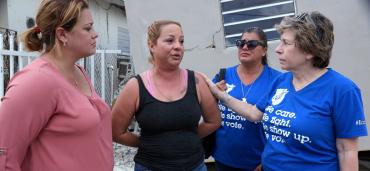Community is our responsibility
In the narrow streets of Guánica, Puerto Rico, last week, I cried with a teacher whose home had collapsed in the recent wave of powerful earthquakes. I saw tarps where roofs should be, reminders that the island is still struggling to recover from the devastation Hurricane Maria wrought two years ago. I talked with children living in tent camps, some whose homes are uninhabitable and others who are too afraid to go inside. As I veered from sadness to anger, the words of Elie Wiesel, the writer and Holocaust survivor, came to mind: “The opposite of love is not hate, it’s indifference.”
President Donald Trump has yet to make a statement about the devastating earthquakes in Puerto Rico. He doesn’t seem to know or care that Puerto Ricans are American citizens. His lack of concern was evident in the wake of Hurricane Maria, when he tossed paper towels to survivors and withheld billions of dollars in disaster relief Congress had allocated, and we see it again now. Such indifference is cruel but not unexpected. It often seems that the people with the greatest needs face the greatest neglect.
[caption]Weingarten, right, with an educator whose home collapsed after earthquakes struck Puerto Rico. Photo credit: Matthew Jones[/caption]
Days before I traveled to Guánica, I was in Scranton, Pa., where I talked with bright and ambitious students and talented and inspiring teachers. More than one-third of children in Scranton live in poverty, yet the state shortchanges the public schools by $32.5 million each year. The effects are evident everywhere you look. Mold spreads uncontrolled in many schools, fed by leaky roofs. Textbooks are tattered and out-of-date. Hundreds of teachers are owed at least $20,000 in back pay.
Yet there are beams of hope in Scranton. I visited a class of 3- and 4-year-olds who excitedly told me about Martin Luther King’s dream—and their own. For all but one, English is their second language, and some started the school year not speaking at all in school. Yet this wonderful pre-K program, with decades of data showing it gives at-risk kids a boost, is on the chopping block. What an appalling indifference to these children’s right to a fair start in life.
At the World Economic Forum this week, Trump took credit for a “blue-collar boom” in jobs and income. Maybe he is too busy tweeting to actually notice that, by most measures, blue-collar and other working-class Americans are falling further behind. More than half of all Americans are not invested in the stock market, and 40 percent can’t come up with $400 in an emergency.
In a new book, Nicholas Kristof and Sheryl WuDunn write about “America’s cancer” caused by the widespread loss of good jobs, dignity and hope. They explore the ravaging effects—substance abuse, family breakdown, incarceration and deaths—on one family, but it could have been countless others. The authors note that working people lost ground as the United States “wrested power from labor and gave it to business, and it suppressed wages and cut taxes rather than invest in human capital.” “America’s cancer” has worsened and spread, not because there was nothing authorities could do about it, but because they were largely indifferent to treating it.
Elected leaders too often neglect their responsibility to help people have a better life. Conversely, my union and our members have made community our responsibility. Educators in Los Angeles went on strike to get more nurses, librarians and counselors for their students. Striking educators in Chicago demanded that the city address its homelessness crisis. Teachers in St. Paul, Minn., rallied this week for mental health teams in every school building.
In Puerto Rico, after Hurricane Maria, the AFT distributed 100,000 water filters so people would have safe drinking water. Now we are providing earthquake survivors food and other essentials, supplies for students, and mental health counselors. And we are raising funds for tents and other portable classrooms and materials so students can return to school and some semblance of normalcy.
In rural McDowell County, W.Va., the AFT has worked with more than 100 community partners over the last decade to overcome the loss of the mining industry the community was built around. Through new education programs, job retraining, housing, and mental health and addiction recovery support, a county that had long been abandoned is turning around.
In Scranton, we are working with parents, educators and elected officials to demand that state leaders fairly and adequately fund public education.
There is deep resilience in these communities, and a desire for a better future. But the magnitude of the challenges they face is too great for them to handle on their own. Investments in education, healthcare and community development can be the growth engines they need. In places where there has been so much indifference to people’s needs, I am proud that our members fight for them—sometimes by striking, sometimes by taking to the streets and sometimes just by showing up.

